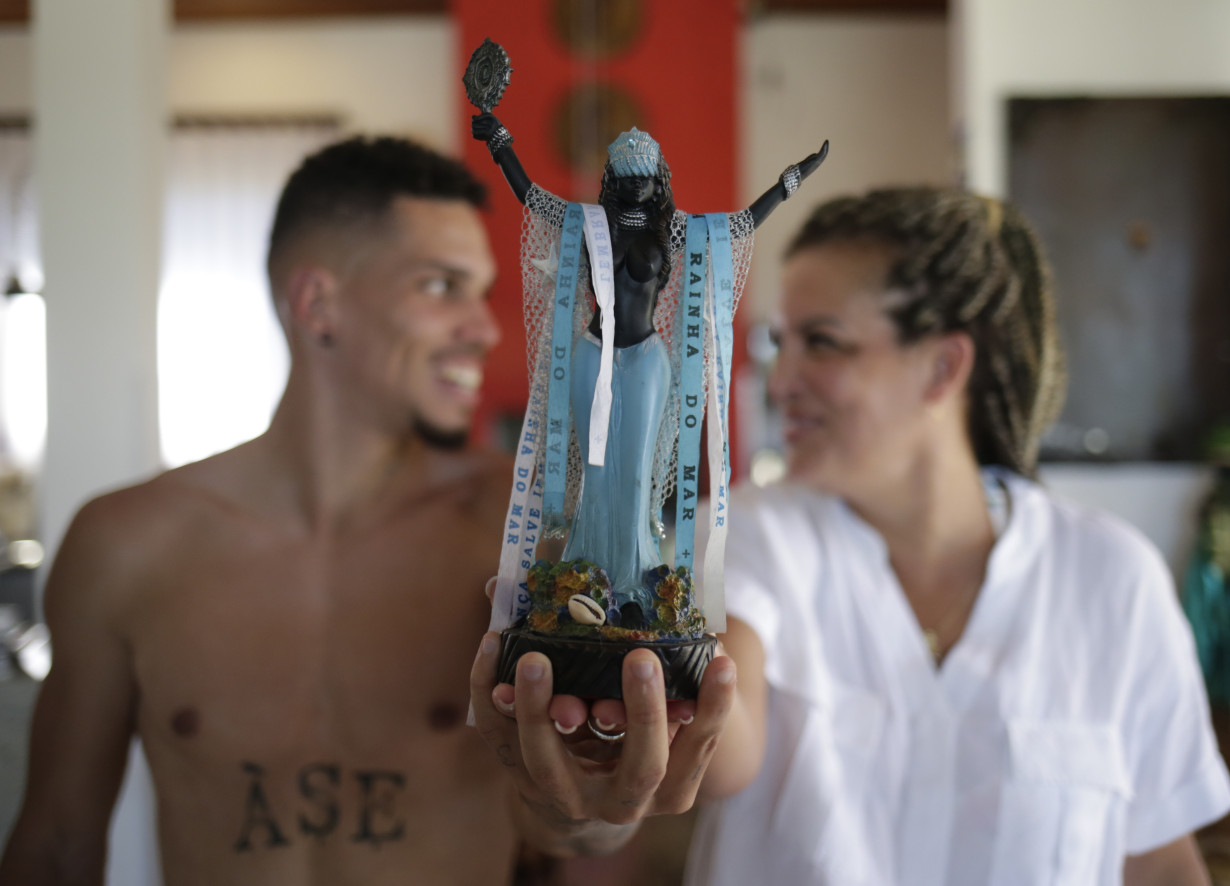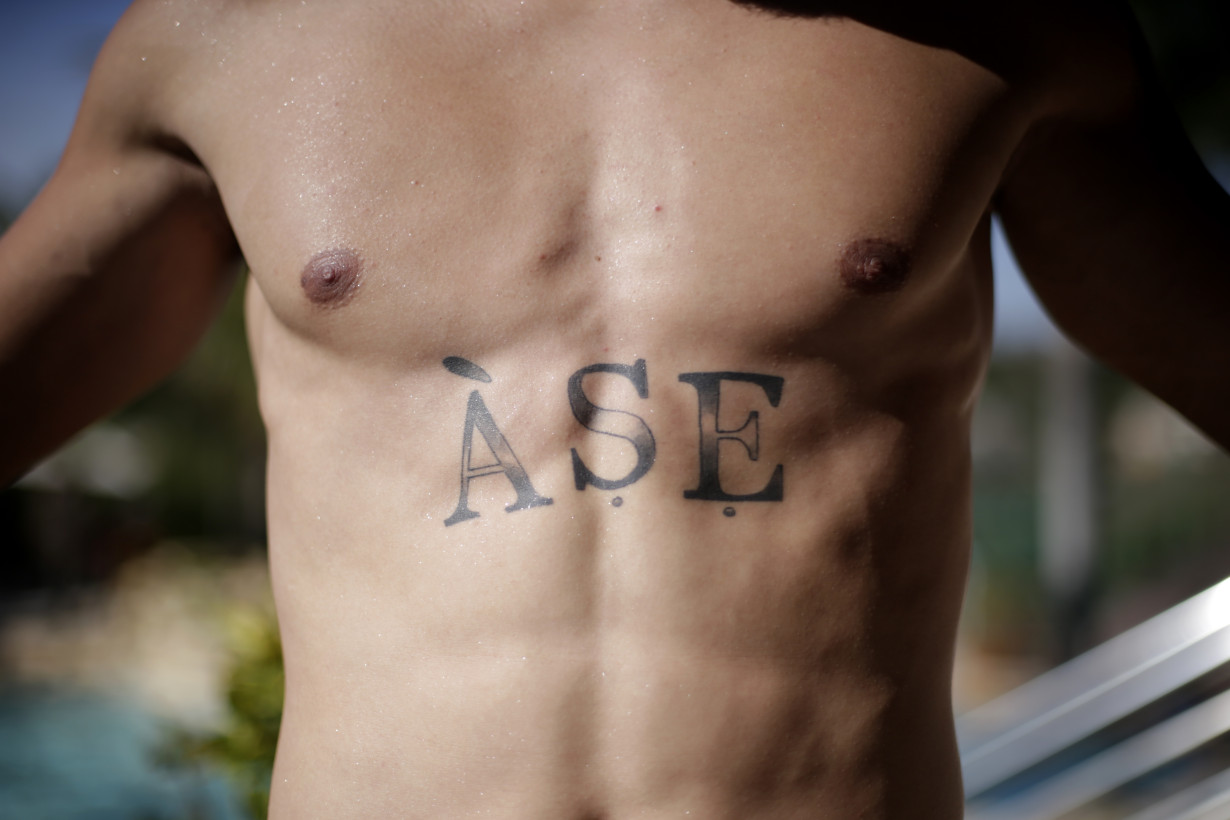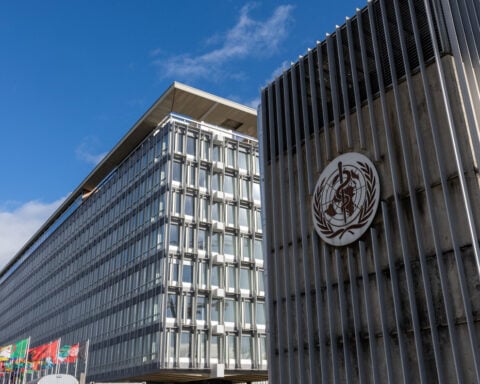LAGOA SANTA, Brazil (AP) — When Brazilian soccer player Paulinho scored a goal at the Tokyo Olympics, he celebrated by pointing an imaginary arrow at the flashing cameras as homage to a deity in his persecuted Afro-Brazilian faith – and taking aim at religious intolerance.
Shortly after, he lost more than 10,000 followers on social media for his public gesture paying tribute to Oxóssi– a godly archer who uses his bow to hunt and feed the hungry.
But he says he gradually gained new fans in his soccer-crazed South American country for representing his Afro-Brazilian religion Candomblé and challenging religious intolerance. His religion has faced a rising tide of harassment, sometimes linked to Brazil’s fast spread of evangelical Christianity.

“Some players ask me about my religion, they want to know what it’s like, … I always tell them, they listen. But it’s still a small minority in soccer,” the 23-year-old player for Brazilian club Atletico Mineiro said in an interview at his home outside the southeastern city of Belo Horizonte. “I…get messages about the way I express myself about the faith, some from people who also believe in the faith, but who aren’t too outspoken. And it’s nice to feel they see something good in what I do.”
Just a small minority in Brazil practices Candomblé. But in recent years there have been increased reports of incidents of religious intolerance against them, particularly at the hands of members of Pentecostal and neo-Pentecostal churches, which focus on spreading faith among nonbelievers.
While most proselytizing is peaceful, some members of African-influenced religions have faced verbal abuse, discrimination and even the destruction of their temples and forced expulsion from neighborhoods.
Growing up in Rio de Janeiro, Paulinho said he suffered prejudice because of his faith -- like his mother and grandmother before him.

Although he wasn’t as involved with Candomblé at the time, he said he also felt targeted after he started his professional career at popular club Vasco da Gama in 2017.
His mother, Ana Christina Sampaio, recalled feeling offended when parents of other players suggested that her son was thriving on the soccer field only because he was being helped by Afro-Brazilian sacrificial rituals.
“They dismissed Paulinho’s talents and effort,” she said. “There’s religious intolerance, of course, but in Brazil it looks like religious racism against Candomblé.”
As Portuguese Catholic colonists brought enslaved Africans to Brazil, those men and women developed blends of their traditional religions with Catholicism. Currently, those faiths are practiced by less than 1% of the 210 million Brazilians.

Academics and religious-freedom advocates say that Afro-Brazilian religions are sometimes demonized in neo-Pentecostal churches. In rare instances, pastors have been found explicitly directing radicalized evangelicals to dispense violence.
“Candomblé has always been persecuted, the only place in Brazil where their followers are the majority is at Carnival,” said sociologist Reginaldo Prandi. He was making note of the popular traditional samba school competition where lyrics citing Candomblé deities, or orixas, have been a constant for decades.
In recent years, samba schools have made a plea to accept people of Afro-Brazilian faith and end religious abuse.
“Prejudice is not enough to annul his soccer skills. If he turns out to be a great player, everybody forgets about his religion. That’s Brazil’s tradition,” Prandi said. “But when he doesn’t do well it will naturally be one of the first things people will say.”

Paulinho said some of the prejudice he endured, prompted him to leave Brazil for European soccer. In 2018, he moved to German club Bayer Leverkusen in a transfer worth $21 million. He played 79 matches and scored nine goals in four years. His faith, he said, was never an issue there.
Paulinho now plays for Brazil’s Atlético Mineiro, a club that during the 1980s had some of the first outspoken evangelical soccer players in the country. He still dreams of playing in England or Spain.
In Brazil, though, he has become a powerful voice for an often-marginalized religious group.
“People realize that I have a greater understanding and knowledge about our religion,” he said. “Looking back… Candomblé has been present in every phase, showing us the way. And now, I can speak with greater confidence.”

Earlier this year, Paulinho once again showed his pride in Candomblé during a game, again stirring his critics and emboldening his supporters. After scoring a goal, he took off his shirt and showed a new tattoo. It read ”Áse″ -- or “energy” in Yoruba, or as Brazilians know it, Axé, which is key to Candomblé.
The backlash came soon after: “Get out of our club, macumbeiro!” an Atletico Mineiro fan said in a posting on Paulinho’s Instagram account. That term is sometimes derisively used to describe members of Macumba, which is defined as “a polytheistic religion of African origin ... practiced mainly by Black Brazilians in urban areas.”
In the same post, another club supporter said: “You care more about candomblé and politics than soccer, you shouldn’t be here.”
Paulinho has also been a target of far-right activists aligned with former Brazilian President Jair Bolsonaro, who has a strong base among evangelicals. Paulinho was one of the few active soccer players to publicly endorse President Luiz Inácio Lula da Silva in the 2022 elections.
Candomblé has long been embraced by Brazilian artists such as Grammy winner Caetano Veloso, which has made the religion more accepted in Brazil’s middle class since the 1960s.
“Back then, the world was seeking other cultures. Europeans went for Buddhism; the Beatles went to India,” Prandi said. “Brazilians didn’t have to go anywhere.
“We had this very scenic and theatrical religion in the state of Bahia, coming from Africans,” he added. “All the intellectuals got involved then, it was our counterculture.”
Nonetheless, Prandi said, persecution of Candomblé persisted.
“Now Brazil has a very conservative movement, which led to Bolsonaro and where people like Paulinho are seen as a threat, for he’s a soccer player that everyone watches,” he said.
Some other players are following Paulinho’s lead. On Sunday, Sao Paulo FC midfielder Rodrigo Nestor came out as a Candomblé follower on national television after scoring his team’s title-winning goal in the Brazilian Cup final against Flamengo.
“My orishas, my mother Iansã were with me,” Nestor told TV Globo after the match, referring to the Candomblé goddess of wind, lightning, magic and fire.
Paulinho hopes to represent Brazil again at next year’s Olympics in Paris. He remains confident of his skills and proud of his religion. Before every game, he says prayers to the deities. And his mother blesses him with water and basil leaves to keep the bad vibrations away.
“My faith has taught me to be patient,” Paulinho said. “That’s also a great virtue of my orisha: Oxóssi has only one arrow, and he must get it right. He needs patience.
“Sometimes, I only have one clear shot in a game. I might get it right; I might miss it.” he added. “But regardless of the result I’m aware that the discipline I learned from Candomblé will allow me to get other opportunities, as long as I keep resilient.”
___
Associated Press religion coverage receives support through the AP’s collaboration with The Conversation US, with funding from Lilly Endowment Inc. The AP is solely responsible for this content.

 Trump has begun another trade war. Here's a timeline of how we got here
Trump has begun another trade war. Here's a timeline of how we got here
 Canada's leader laments lost friendship with US in town that sheltered stranded Americans after 9/11
Canada's leader laments lost friendship with US in town that sheltered stranded Americans after 9/11
 Chinese EV giant BYD's fourth-quarter profit leaps 73%
Chinese EV giant BYD's fourth-quarter profit leaps 73%
 You're an American in another land? Prepare to talk about the why and how of Trump 2.0
You're an American in another land? Prepare to talk about the why and how of Trump 2.0
 Chalk talk: Star power, top teams and No. 5 seeds headline the women's March Madness Sweet 16
Chalk talk: Star power, top teams and No. 5 seeds headline the women's March Madness Sweet 16
 Purdue returns to Sweet 16 with 76-62 win over McNeese in March Madness
Purdue returns to Sweet 16 with 76-62 win over McNeese in March Madness







